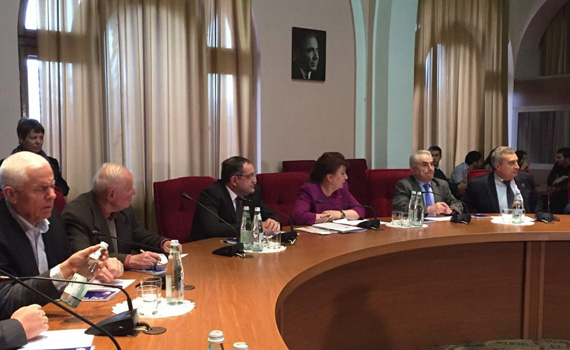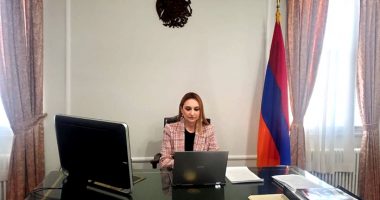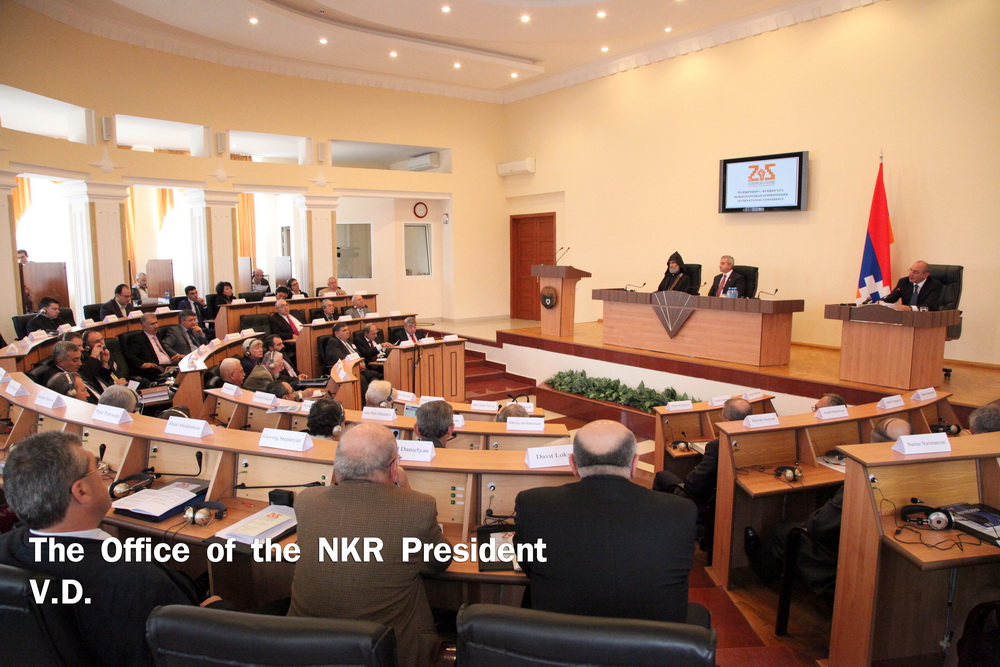YEREVAN — Armenia’s Ministry of Diaspora launched a two-day conference on Friday, December 18, titled “The Denial of the Armenian Genocide in the Context of the Neo-Ottoman Ideology” at the National Academy of Sciences (NAS).
Minister of Diaspora Hranush Hakobyan delivered opening remarks at the event. “When we were planning this conference last year, we couldn’t even predict these sharp changes taking place in the world today,” she said. “In the midst of the current global, regional and domestic challenges, Armenia’s problems are becoming important issues for study and discussion.”
Dwelling upon Neo-Ottomanism, the Minister analyzed discrepancies in Turkey’s policy. According to her, despite harping on “zero problems with neighbors” and establishment of multilateral relations, Turkey does the exact opposite. “The closed border with Armenia is another evidence of the discrepancies between Turkey’s policy and the country’s working style. Today, more than ever, we are witnessing denial of the Armenian Genocide and distortion of facts,” Hakobyan added.
Also addressing the conference was academician-secretary of the Armenian Studies and Social Sciences Section of the NAS Yuri Suvaryan, who stressed the need to create mechanisms for making a transition from recognition to reparation in order to prevent further denial of the Genocide.
According to Armenian Deputy Minister of Justice Vigen Kocharyan, coordinated efforts in all sectors, including holding such conferences, are of special importance.
The speeches were followed by the first session, moderated by the head of the Chair of Turkish Studies at Yerevan State University Alexander Safaryan.
Ruben Safrastyan, director of the Armenian National Academy of Sciences’ institute of Oriental Studies presented his ideas in a report titled “Turkey in Erdogan’s Neo-Ottoman Era: Adventurist Foreign Policy and cynical Denialism.”
The Deputy Dean of the Faculty of Oriental Studies further elaborated on the topic, presenting the report “Neo-Ottomanism and Turkey’s state theses of Armenian Genocide denial.”
Also addressing the conference was political analyst, head of Integration and Development NGO Aram Safaryan, who dwelled upon “The Jewish Experience of Struggle against Genocide denial and our problems.”
Historian, head of the NAS Department of History of Armenian Genocide Armen Marukyan reported on “The Main Components of Turkish Conception of Armenian Genocide Denial.”
Two more panel discussions were hrlf on Saturday. The second session was moderated by Armenia’s Deputy Minister of Diaspora Serzh Srapionyan.
Head of the Chair of Turkish Studies at Yerevan State University Alexander Safaryan delivered a speech on “The Issues of Neo-Ottomanism and Post-Soviet Turkology.”
Director of the Center for International and Comparative Law Taron Simonyan gave a speech entitled “The Foundations and Mechanisms for International Liability for the Armenian Genocide”.
The participants of the conference engaged in a heated debate over the speech titled “The Denial of the Armenian Genocide: Before and After the ECHR’s Decision on Perincek vs. Switzerland” by candidate of legal sciences Levon Gevorgyan.
Senior scientific worker of the NAS Institute of Oriental Studies Anush Hovhannisyan presented a slide show during her speech on “The Methods and Mechanisms of Denial of the Armenian Genocide in Turkey Today.”
The third panel session was moderated by Deputy Dean of the Faculty of Oriental Studies at Yerevan State University Ruben Melkonyan.
Turkologist, Head of the Turkish Section of the Center for Studies on Western Armenians’ Issues and candidate of historical sciences Meline Anumyan gave a speech on “Attempts of Distortion of Certain Facts in the 1919-21 Trials of the Young Turks in Contemporary Turkish Historiography”.
Genocide expert and political scientist Mari Hovhannisyan made important methodological proposals for the struggle against denialism in her speech, titled “The Pivotal Points of Denial of the Armenian Genocide in the Context of Transfiguration of Role-Players and Manifestations”.
After the session, President of Yeprat Research Center Gevorg Petrosyan gave a speech entitled “Common Pain: Turkey’s Current Policy on Denial of the Armenian Genocide”.
Summing up the results of the conference, Armenia’s Minister of Diaspora Hranush Hakobyan suggested organizing similar conferences every December.
“I believe a year is enough for us to examine Turkey’s denialist policy and the new developments in the region and draw conclusions,” the Minister said.










